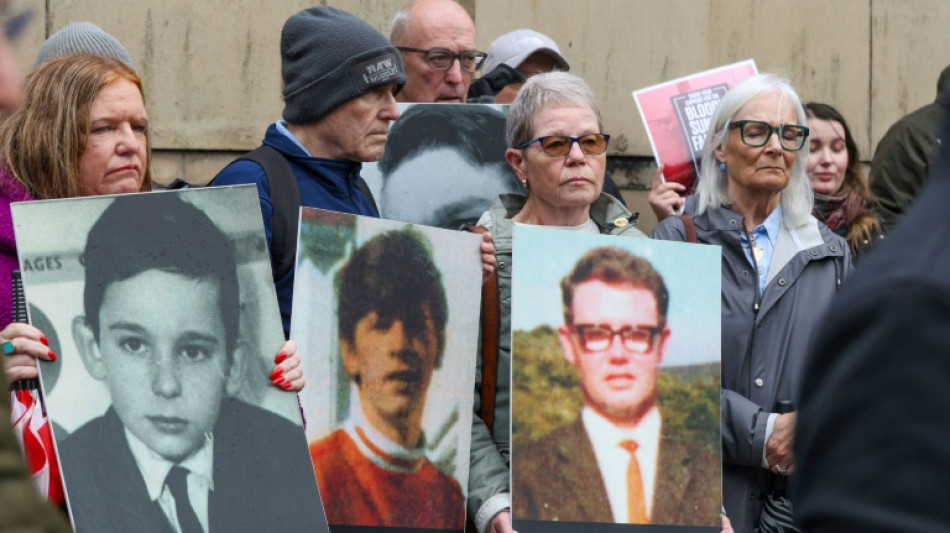
RYCEF
0.5300


The first ever trial of a former British soldier accused of murder over the Bloody Sunday massacre began on Monday in Belfast -- a landmark moment in Northern Ireland's conflict-scarred history.
The ex-paratrooper -- identified only as "Soldier F" -- faces two murder and five attempted murder charges over the 1972 atrocity, one of the most significant events in the three-decade "Troubles" that plagued the British territory.
He has pleaded not guilty and last year applied to have the case against him dismissed but a judge rejected his claim.
The case has proven deeply divisive in Northern Ireland, where the decades of sectarian violence that began in the 1960s still cast a long shadow.
The former soldier is charged with murdering civilians James Wray and William McKinney and attempting to murder five others during the crackdown on a civil rights protest in Londonderry -- also known as Derry -- more than half a century ago.
British troops opened fire on protesters in the majority Catholic Bogside area of Londonderry, Northern Ireland's second-largest city, on January 30, 1972, killing 13 people.
A 14th victim later died of his wounds.
Soldier F plea to remain anonymous throughout the proceedings was granted by the judge.
He appeared on Monday hidden behind a curtain for the trial, which is due to last several weeks.
- State apology -
Relatives of the victims gathered outside the court before the trial began, many bearing posters of those killed with a demand for justice.
John McKinney, brother of William McKinney, said it was "a momentous day in our battle to secure justice for our loved ones who were murdered on Bloody Sunday".
The families were placing their "trust in the hands of the public prosecution service", he added.
"We have waited 53 long years for justice and, hopefully, we will get a measure of it through this trial," Tony Doherty, whose father Patrick was among the victims, told local media on Friday.
Bloody Sunday helped galvanise support for the Provisional IRA, the main paramilitary organisation fighting for a united Ireland.
It was one of the bloodiest incidents in the conflict known as the Troubles, during which some 3,500 people were killed.
It largely ended with the 1998 peace accords.
Northern Irish prosecutors first recommended Soldier F stand trial in 2019.
An inquiry in 1972 after the killings cleared the soldiers of culpability but was widely seen by Catholics as a whitewash.
That probe -- the Widgery Tribunal -- closed off prosecutions and only decades later after the 1998 peace accords was a new investigation -- the Saville Inquiry -- opened.
- Legal history -
That 12-year public inquiry -- the largest investigation in UK legal history -- concluded in 2010 that British paratroopers had lost control and none of the casualties posed a threat of causing death or serious injury.
The probe prompted then prime minister David Cameron to issue a formal apology for the killings, calling them "unjustified and unjustifiable".
Northern Irish police then began a murder investigation into Bloody Sunday and finally submitted their files to prosecutors in 2016.
The case against Soldier F has faced multiple delays.
Bringing other former soldiers to trial is widely seen as unlikely, as many witnesses have died in the intervening years.
Contentious UK legislation passed under the Conservatives in 2023, the Legacy Act, also effectively ended most Troubles-era prosecutions for both former soldiers and paramilitaries.
Northern Ireland Secretary Hilary Benn formally started the process to repeal the act in December.
Irish Prime Minister Micheal Martin said on Friday that Dublin and London were "very close" to agreeing a new framework on Troubles legacy issues, after talks with British counterpart Keir Starmer.
In November 2022, former British serviceman David Holden became the first soldier convicted of a killing committed during the Troubles since the 1998 accords.
He went on to receive a three-year suspended sentence for manslaughter for shooting 23-year-old Aidan McAnespie in 1988.
A.Kwok--ThChM